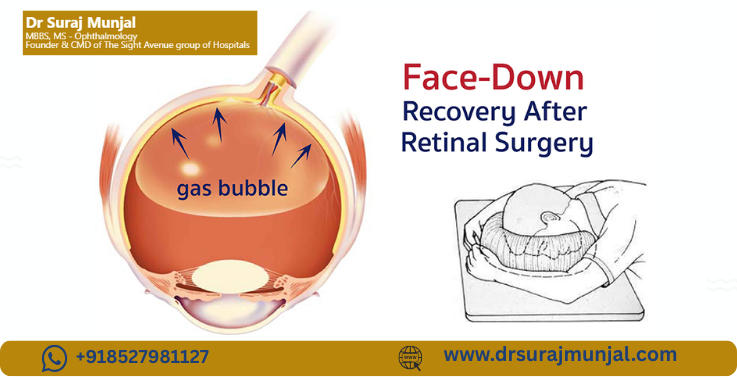Face-Down Recovery After Retinal Surgery
Retinal surgery is a delicate procedure aimed at repairing issues like retinal detachment, macular holes, or epiretinal membranes. After surgery, patients are often required to maintain a face-down recovery position for a specific period to aid the healing process. This position allows the gas bubble or silicone oil placed during surgery to hold the retina in place, facilitating proper healing.
Dr. Suraj Munjal, a renowned ophthalmologist, specializes in retinal surgeries and ensures a smooth recovery process for his patients.
Table of Contents
Causes of Retinal Surgery
Retinal surgery is typically recommended to address various eye conditions that affect the retina, including:
- Retinal Detachment: Occurs when the retina separates from the back of the eye.
- Macular Hole: A small break in the macula, the central part of the retina, that affects central vision.
- Epiretinal Membrane: A thin layer of scar tissue on the retina that can blur or distort vision.
- Diabetic Retinopathy: Damage to the blood vessels in the retina due to diabetes, leading to vision loss.
If left untreated, these conditions can lead to permanent vision loss, which is why timely surgical intervention is crucial.
Types of Retinal Surgery
There are different types of retinal surgery, depending on the condition:
- Vitrectomy: Removal of the vitreous gel from the eye and replacing it with a gas bubble or silicone oil.
- Scleral Buckling: A band is placed around the eye to push the retina back into place.
- Pneumatic Retinopexy: A gas bubble is injected into the eye to help reattach the retina.
- Laser Surgery: Used to seal retinal tears or close off blood vessels.
Each procedure requires a tailored recovery plan, including a face-down recovery period in some cases.
Symptoms That Require Retinal Surgery
Certain symptoms indicate retinal problems and may require immediate medical attention, including:
- Sudden Onset of Floaters or Flashes: Small shapes or light streaks in your vision.
- Shadow or Curtain-Like Effect: Partial loss of vision that feels like a curtain is drawn over your sight.
- Blurred or Distorted Vision: Trouble seeing straight lines, which may appear wavy or bent.
- Loss of Central Vision: Difficulty focusing on objects or reading.
If you experience any of these symptoms, schedule an appointment with Dr. Suraj Munjal immediately for an evaluation.
Diagnosis of Retinal Conditions
Dr. Suraj Munjal utilizes the latest diagnostic tools to assess retinal conditions, such as:
- Ocular Ultrasound: To check for detachment or bleeding behind the retina.
- Optical Coherence Tomography (OCT): A high-resolution imaging technique to capture cross-sections of the retina.
- Fluorescein Angiography: A dye test to examine the retina’s blood vessels.
Early diagnosis ensures timely treatment and better outcomes.
Treatment and Importance of Face-Down Recovery
The primary treatment for many retinal conditions involves surgery, followed by a face-down recovery period. Here’s why it’s essential:
- Helps Keep the Retina in Place: The face-down position ensures that the gas bubble or silicone oil used during surgery remains in contact with the retina.
- Reduces Complications: It aids in preventing further retinal detachment and promotes faster healing.
- Improves Vision Restoration: Proper recovery increases the chances of restoring lost vision after surgery.
Patients may need to stay in the face-down position for several days to weeks, depending on their condition and the type of surgery performed.
Cost of Treatment and Stay in India
India has become a sought-after destination for high-quality, affordable eye care. Dr. Suraj Munjal offers world-class retinal surgeries at competitive costs. Here’s a breakdown:
- Cost of Retinal Surgery: The cost can range from $2,000 to $4,000, depending on the complexity of the case and the type of surgery.
- Cost of Face-Down Recovery Equipment: Additional equipment like face-down chairs or pillows may range from $50 to $200.
- Stay in India: India offers affordable and comfortable accommodations for medical tourists, with hotel rates starting from $20 per day. Patients may need to stay for at least a week post-surgery for follow-up appointments.
Frequently Asked Questions
The recovery period can vary, but most patients need to maintain the face-down position for 5 to 14 days, depending on the surgery’s complexity and Dr. Munjal’s recommendations.
This position helps keep the gas bubble or silicone oil in contact with the retina, allowing it to heal properly without detaching again.
No, it’s best to use a specially designed face-down pillow or recovery chair to ensure comfort and maintain the correct position for long periods.

